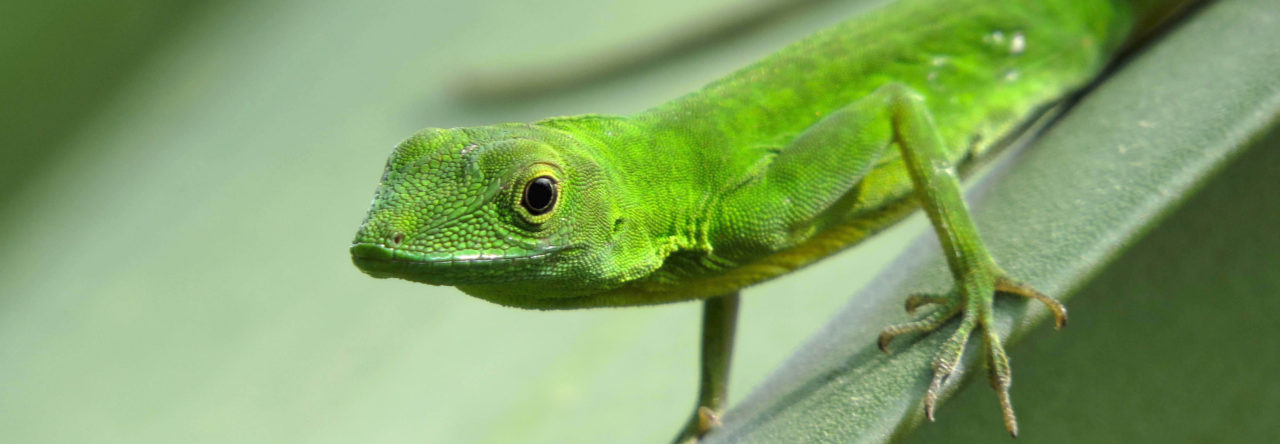The Anolis literature is replete with examples of lizards altering the properties of movement-based displays in response to fluctuations in environmental conditions. Anoles modulate head-bob amplitude based on social context (Fleishman 1988) and social spacing (Stamps and Barlow 1973, Steinberg & Leal 2013), and head-bob speed based on background vegetation motion (Ord et al. 2007) and many other habitat variables (e.g., Ord et al. 2010). Our recent paper adds predation pressure to this growing list of factors that might affect the signal properties of anoles.
Author: DavidSteinberg
 Previous posts and associated comments have discussed Scoliodentosaurophobia (here and here) and its prevalence in some anole-rich regions of the Caribbean. I’ve noticed similar attitudes in the US Southeast. In fact, a woman in South Carolina once begged me to kill all the “bugs” (juvenile A. carolinensis) in her bedroom because they disgusted her so much. One interesting way to counter this aversion may be through a public celebration and discussion of lizards. Yaihara Fortis Santiago did just this in an article recently published in El Nuevo Dia, which highlights the well-known lizards of Puerto Rico. Although the article focuses mainly on Sphaerodactylus and Saul Nava’s plans to replicate a recent experiment conducted by Duke’s Manuel Leal, you will notice that the featured photograph is not of a sphaero at all … it’s an anole! Still the world’s most beloved lizard.
Previous posts and associated comments have discussed Scoliodentosaurophobia (here and here) and its prevalence in some anole-rich regions of the Caribbean. I’ve noticed similar attitudes in the US Southeast. In fact, a woman in South Carolina once begged me to kill all the “bugs” (juvenile A. carolinensis) in her bedroom because they disgusted her so much. One interesting way to counter this aversion may be through a public celebration and discussion of lizards. Yaihara Fortis Santiago did just this in an article recently published in El Nuevo Dia, which highlights the well-known lizards of Puerto Rico. Although the article focuses mainly on Sphaerodactylus and Saul Nava’s plans to replicate a recent experiment conducted by Duke’s Manuel Leal, you will notice that the featured photograph is not of a sphaero at all … it’s an anole! Still the world’s most beloved lizard.
Anyone else with links to articles about anoles published in their country of origin?
 Previous contributors have discussed the use of Anolis as an educational tool at the K-12 level (see here and here). But what happens when teachers don’t take anoles to the students? The answer is quite simple: the kids bring the anoles to them! Alex C., a sixth grader who recently graduated from my brother’s fifth grade class in PA, just passed along a “Discovery Quest” presentation that he created for fun (and to learn, of course). The topic: Green Anoles! I think it’s safe to say that our favorite lizards have so effectively permeated mainstream culture that the recruitment of anole biologists should prove an easy task from here on out. We look forward to having you in the field in about a decade, Alex C. (and all you other future anole experts)!
Previous contributors have discussed the use of Anolis as an educational tool at the K-12 level (see here and here). But what happens when teachers don’t take anoles to the students? The answer is quite simple: the kids bring the anoles to them! Alex C., a sixth grader who recently graduated from my brother’s fifth grade class in PA, just passed along a “Discovery Quest” presentation that he created for fun (and to learn, of course). The topic: Green Anoles! I think it’s safe to say that our favorite lizards have so effectively permeated mainstream culture that the recruitment of anole biologists should prove an easy task from here on out. We look forward to having you in the field in about a decade, Alex C. (and all you other future anole experts)!
Anyone else with stories of anole addictions beginning at a young age? These can be auto-biographical or about those you know!


